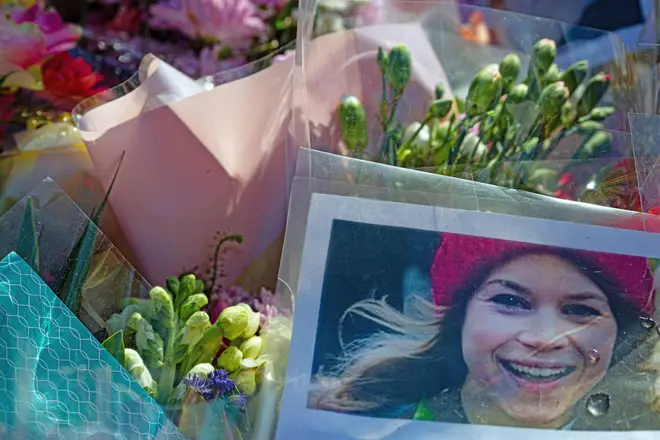
Paul Brand 10am - 12pm
29 February 2024, 11:11 | Updated: 29 February 2024, 12:19

A public inquiry into the kidnap, rape and murder of Sarah Everard by Wayne Couzens in 2021 has revealed the former officer continued to serve despite the attempted kidnap of one woman at knifepoint and the rape of two others.
The newly-released 350-page report revealed that Couzens tried to kidnap one woman at knifepoint prior to the killing of Sarah Everard.
It also flags that he was allowed to continue serving as part of the force despite eight separate reports of indecent exposure.
Couzens was also accused of a series of "very serious" sexual offence against a young girl while he was in his twenties.
Lady Elish Angiolini, who has overseen the inquiry, revealed the young girl was "barely into her teens" when he is said to have committed the offences.
Lady Angiolini's report explains that Couzens sexually assaulted a child, tried to kidnap a woman at knife point and was reported to police eight times for indecent exposure before he killed the 33-year-old in South London on March 3, 2021.
It comes as Sarah Everard's family has revealed that 'Sarah only died because he was a police officer.’
London Mayor Sadiq Khan also admitted to LBC that "red flags" about Sarah Everard’s killer should have seen him kicked out of the force.
The then-serving PC had served in three police forces before he comitted the murder, moving from Kent Police to the Civil Nuclear Constabulary (CNC) before joining the Metropolitan Police.
Lady Elish Angiolini has described the culture in policing as doing ‘nothing to discourage his misogynistic views’ meaning his ‘deviant behaviour could flourish’.

Casey report says Met Police may have more officers like Couzens and Carrick
She said: “The evidence seen by the Inquiry has shown that failures in recruitment and vetting meant Couzens was able to continue a policing career which should have been denied to him.
“Failures in investigations into allegations of indecent exposure meant opportunities to disrupt Couzens’ offending and bring his policing career to a halt were missed.
“Three separate forces allowed him the privilege of being a police officer when they could and should have stopped him.”
The inquiry found eight occasions in which alleged incidents of alleged indecent exposure were reported to police between 2008 and 2021
It also revealed that Couzens allegedly behaved in an intimidating manner towards a woman at an event for reservists in 2003 while he was in the Territorial Army.

Mayor Sadiq Khan as a report condemns police for ‘repeated failures’ to stop Sarah Everard’s killer
The first report from the Angiolini Inquiry also hit out at ‘lethargic and inadequate’ investigations into indecent exposure offences, calling for an overhaul to how seriously they’re looked at.
It’s after Couzens was reported for driving while naked and erect in 2015 with the call handler marking it ‘low risk’ and the investigation being closed within nine days, with no further action taken.
This was marked by the inquiry as ‘a red flag and a missed opportunity to disrupt or prevent Couzens’ offending and allowed him to continue working as a police officer’.
Lady Elish also reported that she was ‘extremely concerned’ that current national guidance for police forces on investigating sexual offences does not appear to include indecent exposure, “supporting a view that it is not a serious offence.”
She said: “I am calling for a step change in the way police respond to indecent exposure cases. More research is needed to understand the link between this offence and the likely trajectory towards serious contact offending.
“Even without that trajectory, victims deserve to have their cases investigated properly.”

Police officer: 'Special place in hell' for Carrick and Couzens
Wayne Couzens was reported to police four times before his arrest following Sarah Everard’s murder – the final time, just days before he abducted her – but he wasn’t charged for any of them until after his conviction for murder.
The 347-page report also revealed that Couzens, while serving as a voluntary Special Constable at Kent Police, had failed vetting to become a regular PC in 2008, but was allowed to continue in his voluntary role.
In 2011, Couzens applied to join the Civil Nuclear Constabulary with his force-level vetting done by Thames Valley Police.
They recommended he should not be approved because of his financial difficulties but the CNC proceeded to put him forward for national vetting, awarding him a higher level of clearance than Counter Terrorism officers get.
In 2018, when he moved to the Met, he wasn’t re-vetted because of that clearance, despite him being reported for indecent exposure three years earlier.
The report said it is a ‘deeply significant failing’ that even if he had been re-vetted, at the time, clearance would have still been recommended.
It also criticised the Met’s reliance on previous vetting when considering the risk assessment of arming officers, saying it should be ‘more robust’.
“Those assessing Couzens’ risk to be an authorised firearms officer were not able to access information about the 2015 indecent exposure allegation,” it said, adding, “If they had, it is likely his application would have been rejected.”
Lady Angiolini described it as a ‘significant gap’ that national security vetting does not have access to the Police National Database which not only records crimes but also intelligence and allegations that have been made.
The inquiry has made 16 recommendations including for a specialist national policy to be established for investigating all sexual offences – including non-contact – by September 2024.
Lady Angiolini has also said police forces should build on their recent work to clear ranks of offending officers by reviewing all allegations of sexual offences against serving officers.

Sarah Everard’s family have welcomed the recommendations, saying: “The Inquiry has raised many important issues and will undoubtedly help to establish changes that will improve the safety of women and girls.
“As a family, the Inquiry has helped us, not just because of its significant findings, but because its implementation made us feel that Sarah’s life was valued and her memory honoured. Her death has not been dismissed as a tragic event to be acknowledged with sympathy and then forgotten.
“It is obvious that Wayne Couzens should never have been a police officer. Whilst holding a position of trust, in reality he was a serial sex offender. Warning signs were overlooked throughout his career and opportunities to confront him were missed. We believe that Sarah died because he was a police officer – she would never have got into a stranger’s car.”
Speaking following the findings, Kent Police said in a statement: "Everyone at Kent Police is shocked, appalled and disgusted by the crimes Wayne Couzens committed against Sarah Everard and we share in the collective grief for her loss.
"Part I of the Angiolini Inquiry report has been made available to us today, and whilst we continue to carefully consider its contents we fully accept the recommendations made of Kent Police.
"We also accept our investigation into a 2015 incident of indecent exposure was flawed due to it being allocated to an officer who was not a trained investigator, and apologise for this failing."